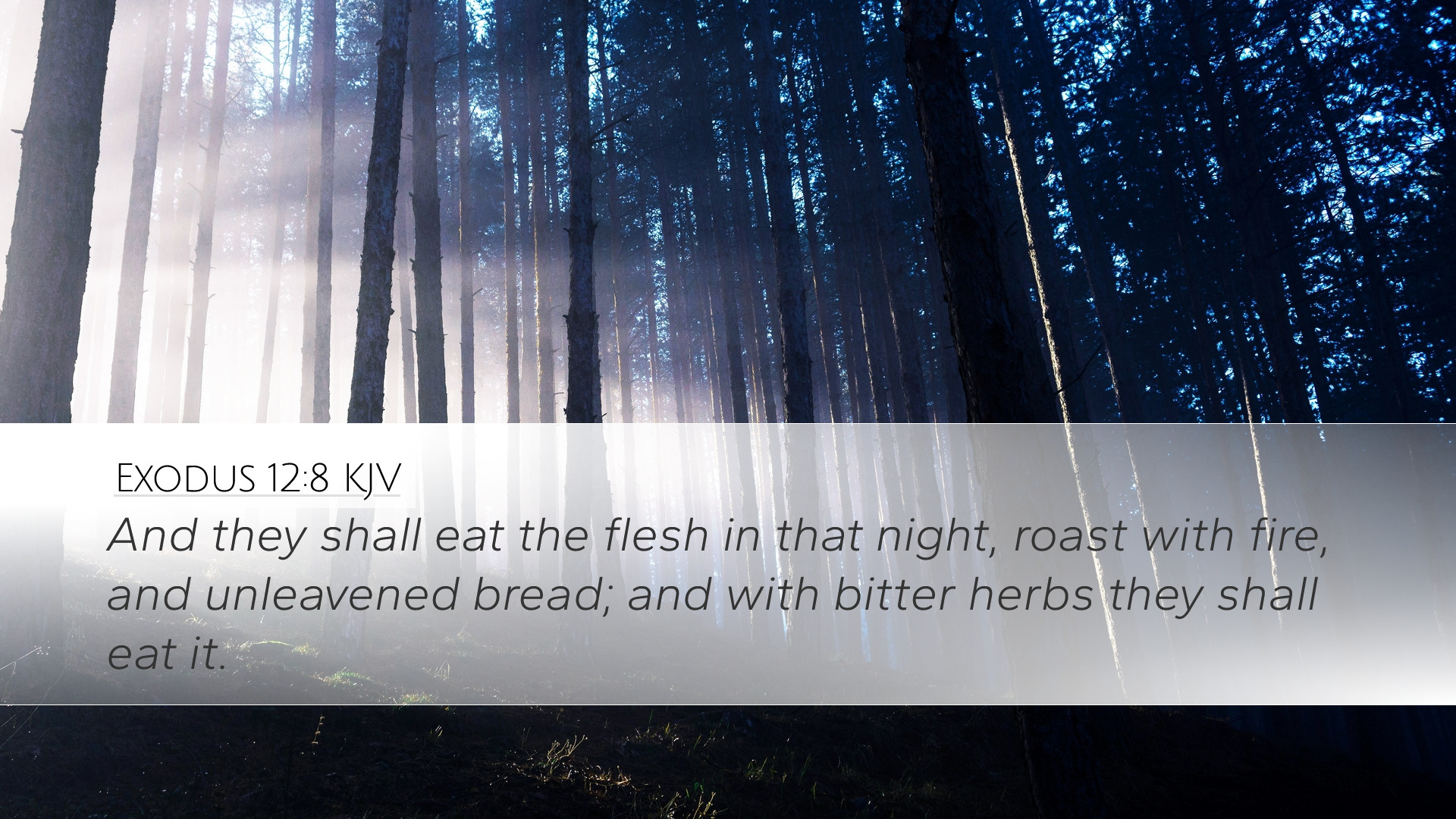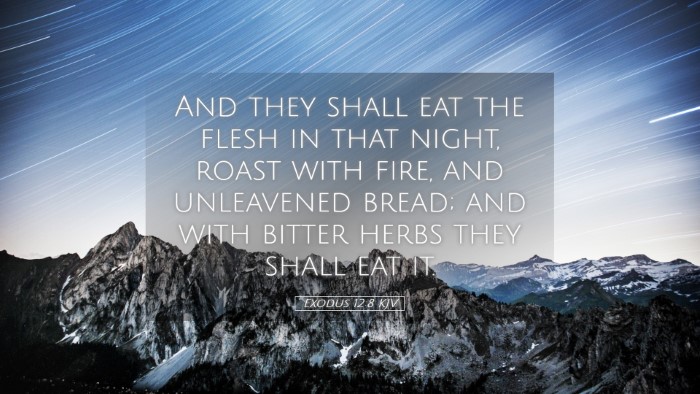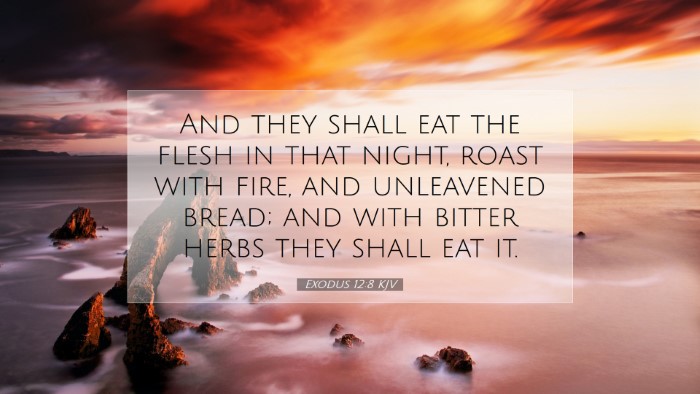Exodus 12:8 - Commentary Summary
Verse Context: The Book of Exodus details the Israelites' liberation from slavery in Egypt, particularly through God's commands and the plagues that led to their eventual release. Exodus 12 marks the institution of the Passover, a pivotal event prefiguring the redemption provided by Christ. Verse 8 specifically discusses the requirement for the Israelites to consume the Passover lamb with unleavened bread and bitter herbs, emphasizing obedience and remembrance.
Insights from Public Domain Commentaries
Matthew Henry's Commentary
In his analysis of Exodus 12:8, Matthew Henry underscores the importance of the Passover in God's covenant with His people. He notes that the act of eating unleavened bread signifies purity and the haste required during the Israelites' departure from Egypt. Leaven, representing sin and corruption, is absent in this observance, symbolizing the moral and spiritual necessity to rid oneself of sin when seeking redemption.
Henry further explains that the bitter herbs are a poignant reminder of the bitterness of slavery, invoking a spirit of gratitude for deliverance. This physical act of eating together is not merely a ritual but a communal experience that unites the Israelite families in faith, memory, and hope. The emphasis on the nature of what is consumed serves as a preparation for their imminent liberation, reflecting God's plan of salvation.
Albert Barnes' Notes
Albert Barnes highlights the symbolic nature of the Passover meal in Exodus 12:8. He emphasizes that this institution was not only for the immediate salvation of the Israelites but was laden with prophetic significance, ultimately pointing towards Christ, the Lamb of God. Barnes notes that consuming the lamb is a way for the people to partake in the sacrifice, which is a foreshadowing of the New Covenant established in Christ.
Moreover, Barnes comments on the specific elements of the meal. The unleavened bread refers to the urgency of God’s deliverance, as the Israelites had to leave quickly, representing both physical and spiritual readiness. The bitter herbs remind the participants of the trials and tribulations suffered in Egypt, underscoring the historical context of their oppression. Barnes encourages readers to understand this Passover observance as a comprehensive experience of remembrance and spiritual preparation.
Adam Clarke's Commentary
Adam Clarke provides a thorough exposition of the verse, framing the Passover as not only physical sustenance but also a theological moment rich with implications. He argues that the requirements given by God serve as a template for future generations, inscribing the essence of liberation and sacrifice within the tradition of the Jewish faith. Clarke points out that each element of the meal reinforces the identity of the Israelites as God's chosen people.
Clarke further expounds on the combination of unleavened bread and bitter herbs. He explains that the unleavened bread signifies that the Israelites were to partake in God’s deliverance without the corruption of sin, highlighting the need for a pure heart. The bitter herbs serve as a necessary reminder of their past sufferings, establishing a continuity of memory that generations would carry forward. Through these elements, Clarke sees a deliberate divine strategy aiming not only for physical escape but spiritual formation.
Theological Implications
The observance of the Passover in Exodus 12:8 resonates deeply within theological discourse, particularly regarding themes of sacrifice, redemption, and communal identity. The elements combined in this meal call attention to the holistic nature of God’s salvation, which encompasses both spiritual and physical realities.
- Redemption Through Sacrifice: The Passover lamb serves as a forerunner to the ultimate sacrifice found in Christ (1 Corinthians 5:7). Just as the blood of the lamb spared the Israelites from judgment, so too does Christ's sacrifice offer salvation to believers.
- Call to Purity: The absence of leaven signifies God’s call toward holiness among His people (1 Peter 1:16). The act of consuming unleavened bread highlights the need for both physical and spiritual readiness in the face of divine intervention.
- Memory and Tradition: The Passover meal reinforces the need for communal and generational remembrance of God's faithfulness. This sets the stage for the development of a community rooted in shared faith and gratitude (Deuteronomy 6:20-25).
Application for Modern Believers
The lessons from Exodus 12:8 and the surrounding context continue to be pertinent for contemporary followers of Christ. The act of remembrance through the communion meal mirrors the Passover in its intent to bring believers together in unity and faith. The sacramental nature of sharing a meal reminds churches of the importance of community in the walk of faith.
Moreover, modern believers are called to reflect on the significance of sacrifice in their own lives. Whether it is through service, generosity, or moral integrity, the essence of the Passover resonates with the Christian journey towards holiness and redemption. The bitter herbs serve as a reminder of life's struggles, inviting believers to cling to the hope of deliverance that God provides.
Conclusion
In conclusion, Exodus 12:8 encapsulates profound theological themes inherent in the biblical narrative of deliverance. Through the insights provided by public domain commentators, we understand that the Passover is not merely an historical event but a multifaceted celebration of God’s redemptive plan for humanity, fulfilled in Jesus Christ.


